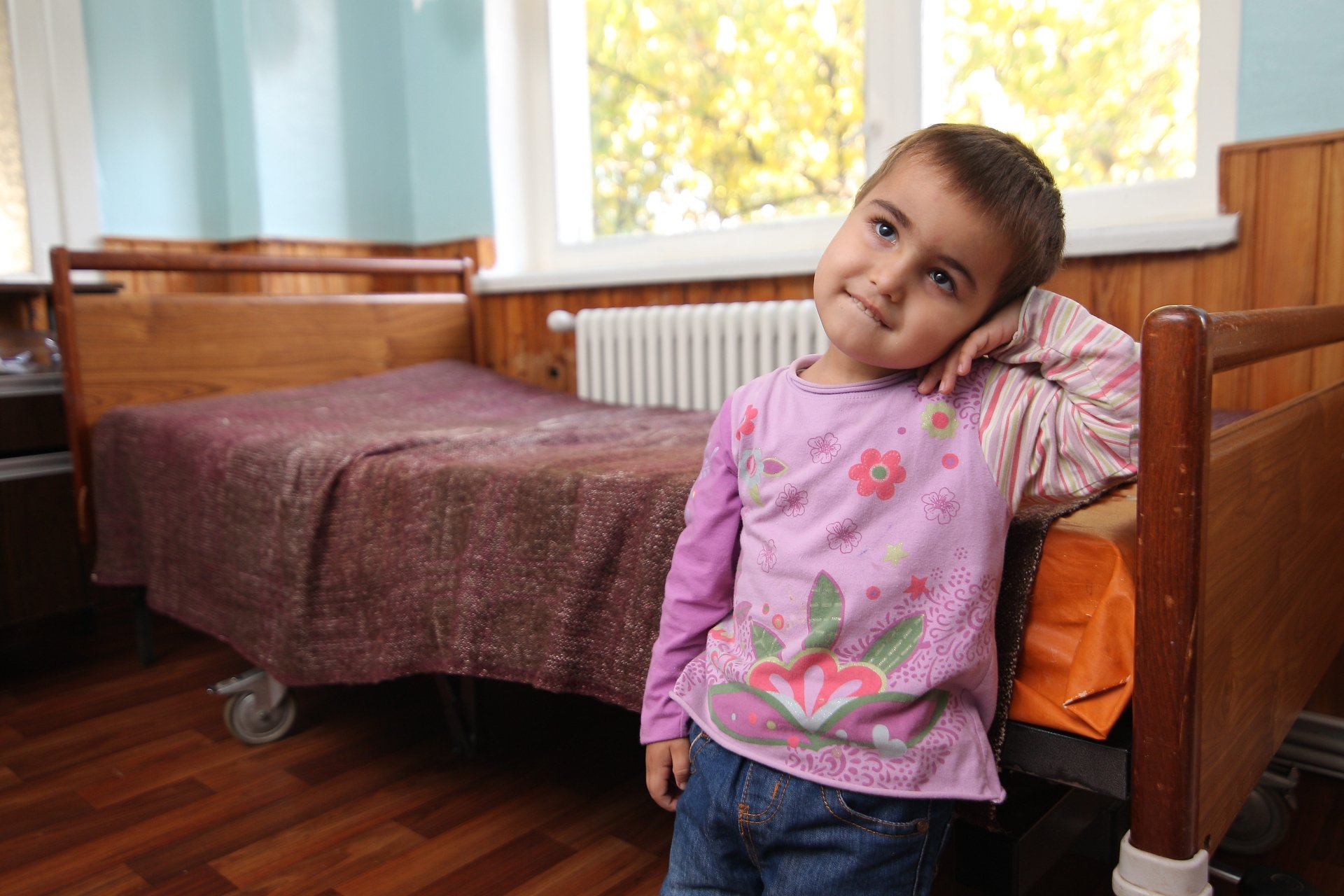Smiling Faces! That is what I remember most from Jim’s and my time in Moldova. There were friendly, smiling faces of Moldovans dancing in the square in Chisinau the first night we were there. We felt so welcome that one of us even picked a partner and joined in.
There was the smiling face of Anna Fortuna and the faces of many of her twenty-four adopted children that came to meet us. There were the faces the children at Kindergarten 110, Chisinau Children’s Tuberculosis Rehabilitation Resident Kindergarten, and of Liuba Josam whose passion has kept the place going even in the darkest days. In Cahul we saw the hopeful face of an American Peace Corps worker, Marisha Marsh, who is trying to help children in her school by providing more indoor toilets for them. Tamara Savenco of Manta met us with a smile of gratitude for past and present help. And with gracious hospitality and smiles on their faces, we were welcomed in the homes of the Bubuioc and Ungureanu families in Lapusna. Even the children who were patients in the respiratory diseases ward showed us their smiling faces as we passed by. And of most amazing were the smiling faces of the special needs children as we visited their center. These were the faces connected to projects that Moldova World Children’s Fund (MWCF) has accomplished and the faces connected to those projects to come. These were the faces that Jim and I grew to love.

Jim and I have known about Ana and Peter Fortuna since the late 1990’s when we heard the story of their going to an orphanage to adopt a baby and departing with eight older children. They said that they saw hope dying in those older faces and could not pass them by. After the Soviet Union dissolved, Peter had no pension and the family was in dire straits. They were all living in a half-finished house and winter was coming. Thanks to MWCF the house was finished with windows and doors to keep out the cold and with only one modern bathroom to accommodate such a large family. (By the time Peter died they had adopted 24 older children hoping to give them a chance at a normal life.) We drove to Drochia to meet Ana and as many of the children who could come.
Of course there was a language barrier but hospitality such as theirs needs no words. Our wonderful translator, Marica, translated all that needed to be said. We ate lunch with Ana – our first introduction to the Moldovan idea of how to feed friends – and the table was groaning with food. (We were delighted to learn that it is impolite to clean one’s plate – as if we could! That means that the host has not fed you enough and so you get another full plate.) One of the many ways that MWCF continues to be involved with the Fortunas is by helping Irina, one of the adopted children, continue her university education.
In summary, I would say that this is a country and a people who embody those traits that made our country what it is today and I, for one, value the life we have in our own country. It is important to Jim and me that all Moldovan children have a chance to reach their full potential.
We were welcomed with smiles by Liuba Josam, the “patron saint” of the Children’s Tuberculosis Rehabilitation Kindergarten, a recent project of MWCF and one which provided a rich store of smiles to remember. Kindergarten 110 houses children recovering from tuberculosis who have been abandoned and/or whose family cannot afford to support them. MWCF paired with other philanthropic agencies and raised money to replace ill-fitting doors and windows, provide indoor bathroom facilities and do other necessary renovations. We were warmly greeted by all and were treated to a performance of singing and dancing by the children.
We will take the memory of all those smiles and cherish them. But not all was work. We toured the Cricova winery located in a massive underground limestone cave, learned how champagne is distilled and then proceeded to be served another huge Moldovan meal along with tasting the wines. We had a full day coming up so it was nice to do something frivolous.
In Cahul the next day we toured an elementary school full of smiling children, some with special needs. This was the first school in the Moldovan system that mainstreamed children with special needs into the regular classrooms. Since there are only ten indoor toilets to serve the 330 students plus the faculty and most of these are “squat” toilets, there is a need for more regular toilets to accommodate both regular students and ones with special needs. Marisha, an American Peace Corps volunteer, had begun to raise money and was asking for assistance to complete the project.
We left the school to visit Tamara Savenco in Manta. Tamara has been deaf since birth and can make only sounds – no words. We saw the pig sty where she had lived and the modest house that MWCF had built for her and her two sons. (MWCF provided the sons with job training and thus they are able to support their mother.) Our ongoing relationship with Tamara includes providing the materials for the renovation of the well on her property that the sons are completing. It will be used for fresh water for family consumption, for watering farm animals and for irrigation and will be shared with the neighbors. As I was looking around, Tamara took my hand and led me inside her home where she proudly showed me every nook and cranny. I was touched by her pride and proud to be a part of the organization that helped her and her sons.
We then visited the home of our interpreter’s parents and met beautiful Alexandra, Marica’s child. There were many smiles and stories around the heavily laden table and we sat and ate until it was time to go visit the home of Victor Bubuioc’s parents. Again we feasted amongst smiles and stories. Both homes are surrounded by vegetable gardens, fruit trees, grape vines, rabbits, pigs and cellars full of home-made wine and vodka. We could see where our delicious and copious meals came from.
Next morning we were back at work visiting the respiratory diseases ward at a local hospital. They were asking MWCF to partner with another agency so that ancient windows could be replaced. The staff proudly showed us around and we met some of the children being treated. It is amazing to think that a ward treating respiratory diseases could exist with little or no protection from the elements.
Our last visit was to an ongoing project, Guiding Star, Gratiesti Center for Children with Special Needs. This one nearly broke my heart. There was a room full of smiling children in a substandard building with no indoor plumbing. Many of these children cannot attend Guiding Star regularly because the only toilet was in an outhouse about fifty yards down a path. Many cannot walk that far and often the weather is too cold and/or wet to go outside. MMWCF is raising money to build an indoor modern bathroom and to renovate another room for these children.
Jim and I have talked about what impressed us so about this country and these people. Why are we so committed to children in that particular part of the world? I would say that there are multiple reasons and here are a few:
- This is a country with beautiful children who are happy under circumstances that most of our children would consider unbearable.
- The teachers and workers show such devotion to and love for the children and that attitude is mirrored in the children’s smiles.
- Even though they have so little, they are not asking for a handout. They are asking for a helping hand.
- Education is a primary focus for Moldovans.
- MWCF does NOT give money to a project and then disappear. We create ongoing relationships.
In summary, I would say that this is a country and a people who embody those traits that made our country what it is today and I, for one, value the life we have in our own country. It is important to Jim and me that all Moldovan children have a chance to reach their full potential.
Gratefully,
– Alice Gordon

